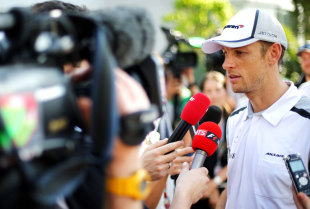

Unless you've been living under a rock since time immemorial, you will be aware of the old maxim that there are three sides to every story: my side, your side, and the truth.
And unless naivety is your stock in trade, you will also approach any and all news coverage with a healthy dose of cynicism. News outlets choose angles to their stories that will suit their readership, or which will not prove to be uncomfortable reading for their advertisers. Protagonists of news events can be cast as heroes or villains depending on one's perspective, and regularly are. One man's freedom fighter is another man's terrorist, and so on.
After the Thursday afternoon media sessions in Sepang it was interesting to hear some of the assembled journalists decide just how to spin the drivers' comments about the sound of the new V6 power units. Jenson Button was widely quoted as saying that anyone who didn't like the sound of the new formula could always find a new category in which to drive, which in some outlets was painted as a direct riposte to Sebastian Vettel's assertion that the 2014 cars sounded "shit".
This despite the fact that the media session in which Button was informed of the defending world champion's comments was a different session to the one in which the McLaren driver told the assembled journalists that any moaning minnies should put up or shut up (I paraphrase). More than one hack was overheard saying that 'these quotes can be twisted to make a great headline'.
For all that we like to complain that modern Formula One drivers are so media-trained and sponsor-friendly that they are bereft of any character, we must also bear some (all?) of the responsibility for creating a situation in which the drivers are afraid to speak candidly less one or more members of the press elect to take their comments out of context in order to generate clicks and pageviews.
During the first winter test in Bahrain, Mercedes' Nico Rosberg was doing a post-session media call in which the German racer said that the Bahrain circuit "was the worst". The comment was made in response to a question about fuel consumption with the new V6s, and the Sakhir Circuit is notoriously fuel hungry. There was nothing controversial in the remark, yet within 24 hours my preferred news aggregator saw a few references to 'Rosberg: "Bahrain the worst track"' or variations thereof.
Is it any wonder that the drivers guard their words, wary of making statements any more controversial than "I love coming to [insert circuit here], it's so challenging to drive" or "The team have been working so hard in the garage, and I couldn't have done it without their support"? It is a situation of our own making, and one that is shamelessly perpetuated. If we want to see the drivers for who they are, we must first prove that we are worthy of their trust, and that their words won't be twisted as clickbait.
